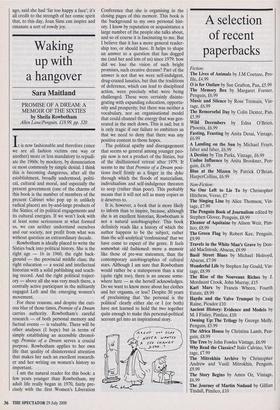Waking up with a hangover
Sara Maitland
PROMISE OF A DREAM: A MEMOIR OF THE SIXTIES by Sheila Rowbotham Allen Lane/Penguin, £18.99, pp. 320 It is now fashionable and therefore (since we are all fashion victims one way or another) more or less mandatory to repudi- ate the 1960s: by mockery, by denunciation or most commonly by simple denial. I think this is becoming dangerous, after all the establishment, broadly understood, politi- cal, cultural and moral, and especially the present government (one of the charms of this book is the number of members of the present Cabinet who pop up in unlikely radical places) are by-and-large products of the Sixties; of its political engagements and its cultural energies. If we won't look with at least some seriousness at what formed us, we can neither understand ourselves and our society, nor profit from what was without question an extraordinary decade.
Rowbotham is ideally placed to write the Sixties back into political history. She is the right age — 16 in 1960; the right back- ground — the provincial middle class; the right education — a social and intellectual historian with a solid publishing and teach- ing record. And the right political traject- ory — above all she was very much there, a centrally active participant in the militantly engaged Left and the emerging women's movement.
For these reasons, and despite the curi- ous blur of those times, Promise of a Dream carries authority. Rowbotham's careful research — of both personal memory and factual events — is valuable. There will be other analyses (I hope) but in terms of simply establishing an accessible chronol- ogy Promise of a Dream serves a crucial purpose. Rowbotham applies to her own life that quality of disinterested attention that makes her such an excellent research- er and her writing on women's history so important.
I am the natural reader for this book: a few years younger than Rowbotham, my adult life really began in 1970, fairly pre- cisely with the first Women's Liberation Conference that she is organising in the closing pages of this memoir. This book is the background to my own personal hist- ory. I know by reputation or acquaintance a large number of the people she talks about, and so of course it is fascinating to me. But I believe that it has a more general reader- ship too, or should have. It helps to shape an answer to a question that has dogged me (and her and lots of us) since 1979: how did we lose the vision of such bright promises, such creative dreams? Part of the answer is not that we were self-indulgent, drug-crazed lunatics, but that the traditions of deference, which can lead to disciplined action, were precisely what were being challenged. These were certainly disinte- grating with expanding education, opportu- nity and prosperity; but there was neither a vocabulary, nor an organisational model that could channel the energy that was gen- erated in the melt down. This is sad; but it is only tragic if our failure so embitters us that we need to deny that there was any positive content to those hopes.
The political apathy and disengagement that seems so general among younger peo- ple now is not a product of the Sixties, but of the disillusioned retreat after 1979. It seems to me that Promise of a Dream posi- tions itself firmly as a finger in the dyke through which the floods of materialism, individualism and self-indulgence threaten to seep (rather than pour). This probably means that it will not sell as many copies as it deserves to.
It is, however, a book that is more likely to inform than to inspire, because, although she is an excellent historian, Rowbotham is not a natural autobiographer. This book definitely reads like a history of which the author happens to be the subject, rather than the self-analytical 'confessional' that we have come to expect of the genre. It feels somewhat old fashioned: more a memoir like those of pre-war statesmen, than the contemporary autobiographies of cultural stars. Although I am sure that Rowbotham would rather be a statesperson than a star (quite right too), there is an unease some- where here — as she herself acknowledges. Do we want to know more about her clothes and her orgasms, or less? Despite 30 years of proclaiming that 'the personal is the political' clearly either she or I (or both) have not learned to hold the two together quite enough to make this personal-political account gel into an inspirational story.


























































 Previous page
Previous page